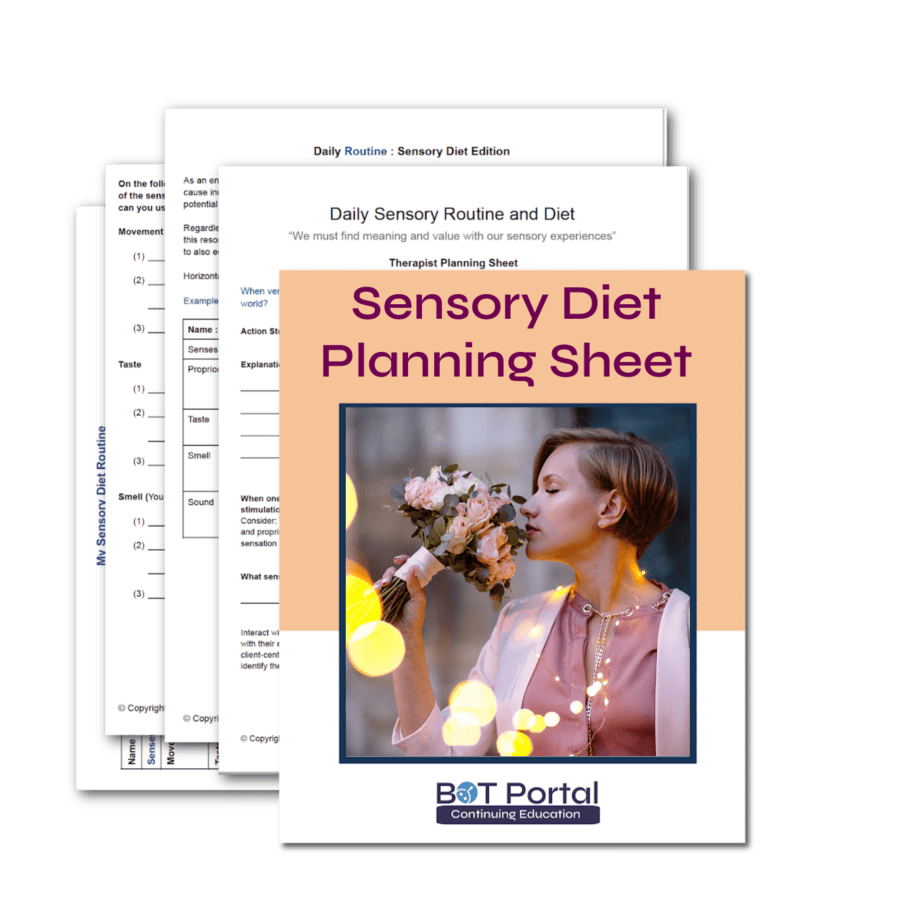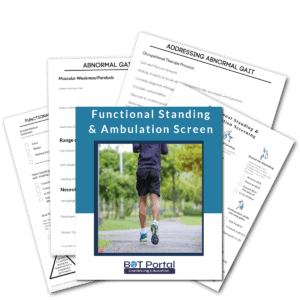Description
Sensory Diet OT
Sensory Diet for Occupational Therapy
Download the pdfs for Sensory Diet OT for a printable packet to use with your patient and caregivers who may have sensory impairments. This handout will help the therapist explore and create a sensory profile and diet for their patients to ensure all senses are being addressed throughout their day to day life.
More Information
In occupational therapy (OT), the term “sensory diet” has gained prominence as a valuable intervention strategy for individuals with sensory processing challenges. Sensory diets, carefully curated schedules of sensory activities, play a pivotal role in helping individuals regulate their sensory experiences and participate more fully in daily activities. Let’s delve deeper into the concept of sensory diets and their application within the field of OT.
What is a Sensory Diet?
A sensory diet, in the context of OT, refers to a personalized plan of sensory activities designed to meet an individual’s sensory needs, promote self-regulation, and enhance participation in daily life tasks. Just as a balanced diet nourishes the body, a sensory diet nourishes the sensory system, providing the right amount and variety of sensory input to support optimal functioning.
Key Components of a Sensory Diet:
- Assessment: Before implementing a sensory diet, OTs conduct thorough assessments to understand an individual’s sensory processing patterns, preferences, sensitivities, and challenges. This assessment may include standardized tools, observations, and interviews with the individual and their caregivers.
- Sensory Modulation: Sensory diets aim to modulate sensory experiences by providing a combination of sensory input to help individuals achieve an optimal level of arousal and regulation. This may include activities to address sensory seeking, sensory avoiding, or sensory sensitivity patterns.
- Individualization: Sensory diets are highly individualized, taking into account each person’s unique sensory profile, developmental stage, interests, and daily routines. OTs collaborate with individuals and their families to tailor sensory activities that align with their goals and priorities.
- Collaboration: Sensory diets often involve collaboration between OTs, individuals, caregivers, educators, and other relevant professionals. This interdisciplinary approach ensures that sensory strategies are integrated into various settings, including home, school, and community environments.
- Adaptive Strategies: OTs provide individuals with a repertoire of adaptive strategies and sensory tools to self-regulate throughout the day. These may include sensory tools such as fidgets, weighted blankets, sensory breaks, calming activities, or environmental modifications.
Benefits of Sensory Diets in OT:
- Improved Self-Regulation: Sensory diets help individuals develop self-awareness and self-regulation skills, enabling them to manage sensory challenges more effectively and participate in daily activities with greater ease and confidence.
- Enhanced Engagement: By addressing sensory needs, individuals are better able to engage in meaningful occupations such as schoolwork, social interactions, self-care tasks, and leisure activities.
- Increased Functionality: Sensory diets support individuals in developing foundational skills necessary for independence and success across various contexts, including attention, motor coordination, social skills, and emotional regulation.
- Promoting Sensory Integration: Sensory diets facilitate sensory integration, the process by which the nervous system organizes and makes sense of sensory information. Consistent exposure to a variety of sensory experiences helps promote adaptive responses and neural plasticity.
What is included?
- Sensory Diet information and explanation
- Sensory-Motor Guide to help determine what parts of the sensory system you should be working on to improve motor output
- Handout for client home exercise purposes
Sensory Diet OT




